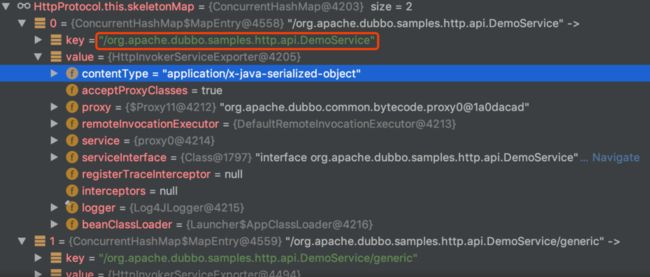CVE-2019-17564 Apache dubbo HTTP协议反序列化漏洞分析
0x01 漏洞描述
Apache dubbo是一个是基于Java的高性能开源RPC框架。它支持dubbo,http,rmi,hessian等协议。本次问题出现在dubbo开启http协议后,会将消费者提交的request请求,在无安全校验的情况下直接交给了spring-web.jar进行处理,最终request.getInputStream()被反序列化,故存在反序列化漏洞。下面我们来调试分析代码。
0x02 影响范围
- 2.7.0 <= Apache Dubbo <= 2.7.4
- 2.6.0 <= Apache Dubbo <= 2.6.7
- Apache Dubbo = 2.5.x
0x03 环境搭建
- OS: Mac OSX
- JDK: 1.8.0_191
- Dubbo: 2.7.3
环境搭建这里我选择官方的samples中的dubbo-samples-http
https://github.com/apache/dubbo-samples/
源码下载后将pom.xml中指定的dubbo版本修改为2.7.3,同时加入commons-collections4-4.0.jar方便测试。
1.8
1.8
2.7.3
4.3.16.RELEASE
4.12
...
...
org.apache.commons
commons-collections4
4.0
同时dubbo依赖zookeeper,请自行安装!
0x04 漏洞分析
dubbo启用http协议后,所有的请求都会通过org.apache.dubbo.rpc.protocol.http.HttpProtocol$InternalHandler类的handle方法进行处理。我们在这打断点,并发送poc开始跟踪分析。
首先handle方法会获取请求路径,然后通过这个路径去skeletonMap里获取到该接口对应的处理对象,来处理当前request请求。
//org.apache.dubbo.rpc.protocol.http.HttpProtocol$InternalHandler
public void handle(HttpServletRequest request, HttpServletResponse response) throws IOException, ServletException {
// 1. 获取请求的路径(/org.apache.dubbo.samples.http.api.DemoService)
String uri = request.getRequestURI();
// 2. 通过请求的接口路径获取对应的处理对象
HttpInvokerServiceExporter skeleton = (HttpInvokerServiceExporter)HttpProtocol.this.skeletonMap.get(uri);
if (!request.getMethod().equalsIgnoreCase("POST")) {
response.setStatus(500);
} else {
RpcContext.getContext().setRemoteAddress(request.getRemoteAddr(), request.getRemotePort());
try {
// 3. 使用获取到的处理对象进行处理请求
skeleton.handleRequest(request, response);
} catch (Throwable var6) {
throw new ServletException(var6);
}
}
} 第二步中存储接口地址和处理对象的skeletonMap
skeletonMap存储内容
处理对象是HttpInvokerServiceExporter类对象,它负责获取远程调用对象,并执行获取结果返回给客户端。跟进它的handleRequest方法,request对象被传入readRemoteInvocation方法中来获取RemoteInvocation远程调用对象
//org.springframework.remoting.httpinvoker.HttpInvokerServiceExporter
public void handleRequest(HttpServletRequest request, HttpServletResponse response) throws ServletException, IOException {
try {
// 1. 从request对象获取远程调用对象
RemoteInvocation invocation = this.readRemoteInvocation(request);
RemoteInvocationResult result = this.invokeAndCreateResult(invocation, this.getProxy());
this.writeRemoteInvocationResult(request, response, result);
} catch (ClassNotFoundException var5) {
throw new NestedServletException("Class not found during deserialization", var5);
}
}readRemoteInvocation方法将request.getInputStream()(我们提交的序列化内容)传入createObjectInputStream方法,封装为一个ObjectInputStream。该对象又被传入doReadRemoteInvocation方法中,进行最终的获取操作。
//org.springframework.remoting.httpinvoker.HttpInvokerServiceExporter
protected RemoteInvocation readRemoteInvocation(HttpServletRequest request) throws IOException, ClassNotFoundException {
// 1. 传入request对象和request.getInputStream()
return this.readRemoteInvocation(request, request.getInputStream());
}
protected RemoteInvocation readRemoteInvocation(HttpServletRequest request, InputStream is) throws IOException, ClassNotFoundException {
// 2. 将request.getInputStream()封装为ObjectInputStream
ObjectInputStream ois = this.createObjectInputStream(this.decorateInputStream(request, is));
RemoteInvocation var4;
try {
// 3. 获取RemoteInvocation远程调用对象
var4 = this.doReadRemoteInvocation(ois);
} finally {
ois.close();
}
return var4;
}在doReadRemoteInvocation方法中,ObjectInputStream类对象ois直接被反序列化了。这个过程中没有进行任何过滤,导致我们传入的恶意序列化对象可以被反序列化创建,漏洞触发!
//org.springframework.remoting.rmi.org.springframework.remoting.rmi.RemoteInvocationSerializingExporter
protected RemoteInvocation doReadRemoteInvocation(ObjectInputStream ois) throws IOException, ClassNotFoundException {
// 1. 恶意对象在此被反序列化,漏洞触发
Object obj = ois.readObject();
if (!(obj instanceof RemoteInvocation)) {
throw new RemoteException("Deserialized object needs to be assignable to type [" + RemoteInvocation.class.getName() + "]: " + ClassUtils.getDescriptiveType(obj));
} else {
return (RemoteInvocation)obj;
}
}0x05 漏洞修复
漏洞出现的原因dubboHTTP接口将携带有恶意反序列化数据的request,在无安全校验的情况下直接交给了spring-web.jar的HttpInvokerServiceExporter进行处理,导致存在反序列化漏洞。按理说这个漏洞不仅仅只是dubbo自身的问题,还是spring的问题。
在2.7.4.1版本开始,dubbo处理HTTP接口的调用请求交给了jsonrpc4j.jar的JsonRpcServer去处理了。
修复方式
跟踪分析JsonRpcServer类的handle方法后,request.getInputStream()没有再被反序列化了。所以原来的利用方法失效了。
0x06 漏洞总结
该漏洞利用虽然简单粗暴,但在黑盒情况下利用难点有两个,一是我们无法得知web服务是否是dubbo http接口。二是如何获取接口路径,该路径可以在服务器上的zookeeper和http-provider配置文件中找到,如果不配合其他漏洞是不容易获取的。
0x07 参考文章
- https://www.mail-archive.com/[email protected]/msg06225.html
- CVE-2019-17564:Apache Dubbo反序列化漏洞分析
- 【安全风险通告】Apache Dubbo反序列化漏洞安全风险通告


